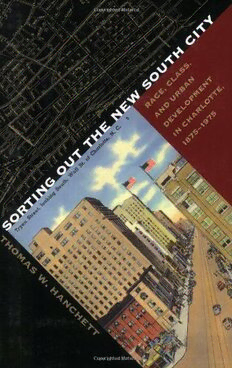Download Sorting out the New South city: race, class, and urban development in Charlotte, 1875-1975 PDF Free - Full Version
Download Sorting out the New South city: race, class, and urban development in Charlotte, 1875-1975 by Thomas W. Hanchett in PDF format completely FREE. No registration required, no payment needed. Get instant access to this valuable resource on PDFdrive.to!
About Sorting out the New South city: race, class, and urban development in Charlotte, 1875-1975
One of the largest and fastest-growing cities in the South, Charlotte, North Carolina, came of age in the New South decades of the late nineteenth and early twentieth centuries, transforming itself from a rural courthouse village to the trading and financial hub of America's premier textile manufacturing region. In this book, Thomas Hanchett traces the city's spatial evolution over the course of a century, exploring the interplay of national trends and local forces that shaped Charlotte, and, by extension, other New South urban centers.Hanchett argues that racial and economic segregation are not age-old givens, but products of a decades-long process. Well after the Civil War, Charlotte's whites and blacks, workers and business owners, all lived intermingled in a "salt-and-pepper" pattern. The rise of large manufacturing enterprises in the 1880s and 1890s brought social and political upheaval, however, and the city began to sort out into a "checkerboard" of distinct neighborhoods segregated by both race and class. When urban renewal and other federal funds became available in the mid-twentieth century, local leaders used the money to complete the sorting out process, creating a "sector" pattern in which wealthy whites increasingly lived on one side of town and blacks on the other.
Detailed Information
| Author: | Thomas W. Hanchett |
|---|---|
| Publication Year: | 1998 |
| ISBN: | 9780807846773 |
| Language: | English |
| File Size: | 3.022 |
| Format: | |
| Price: | FREE |
Safe & Secure Download - No registration required
Why Choose PDFdrive for Your Free Sorting out the New South city: race, class, and urban development in Charlotte, 1875-1975 Download?
- 100% Free: No hidden fees or subscriptions required for one book every day.
- No Registration: Immediate access is available without creating accounts for one book every day.
- Safe and Secure: Clean downloads without malware or viruses
- Multiple Formats: PDF, MOBI, Mpub,... optimized for all devices
- Educational Resource: Supporting knowledge sharing and learning
Frequently Asked Questions
Is it really free to download Sorting out the New South city: race, class, and urban development in Charlotte, 1875-1975 PDF?
Yes, on https://PDFdrive.to you can download Sorting out the New South city: race, class, and urban development in Charlotte, 1875-1975 by Thomas W. Hanchett completely free. We don't require any payment, subscription, or registration to access this PDF file. For 3 books every day.
How can I read Sorting out the New South city: race, class, and urban development in Charlotte, 1875-1975 on my mobile device?
After downloading Sorting out the New South city: race, class, and urban development in Charlotte, 1875-1975 PDF, you can open it with any PDF reader app on your phone or tablet. We recommend using Adobe Acrobat Reader, Apple Books, or Google Play Books for the best reading experience.
Is this the full version of Sorting out the New South city: race, class, and urban development in Charlotte, 1875-1975?
Yes, this is the complete PDF version of Sorting out the New South city: race, class, and urban development in Charlotte, 1875-1975 by Thomas W. Hanchett. You will be able to read the entire content as in the printed version without missing any pages.
Is it legal to download Sorting out the New South city: race, class, and urban development in Charlotte, 1875-1975 PDF for free?
https://PDFdrive.to provides links to free educational resources available online. We do not store any files on our servers. Please be aware of copyright laws in your country before downloading.
The materials shared are intended for research, educational, and personal use in accordance with fair use principles.

